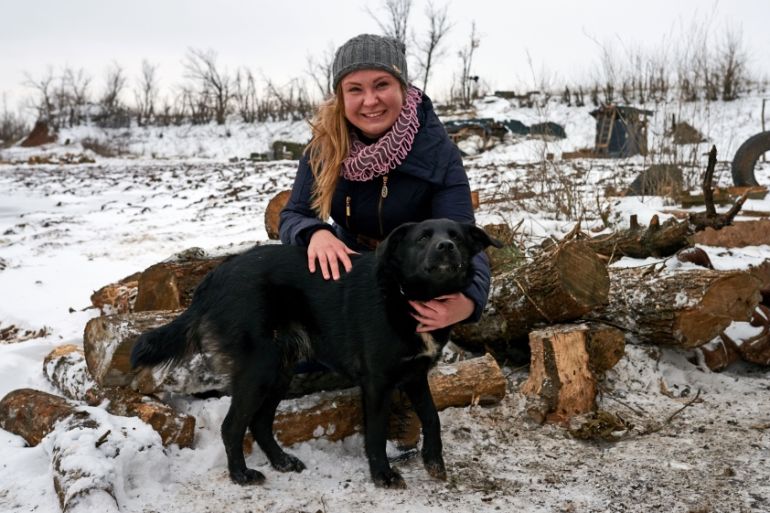Ukraine: A female fixer on the front lines
In the first of a three-part series profiling journalism fixers, Al Jazeera talks to one covering conflict in Ukraine.

For fixers, news stories are often personal.
They are locals, sometimes journalists themselves, who serve as guides for foreign correspondents.
Keep reading
list of 4 itemsJournalist loses foot after being badly wounded in Israeli attack in Gaza
The Take: Layoffs are decimating the media industry. Who profits?
Media feel pressure to tell ‘positive’ China story as party tightens grip
Equipped with intimate local knowledge, they find stories, secure interviews, and translate for correspondents who may have little experience in the country they are reporting from.
Long after those correspondents have left, fixers remain in their communities.
If they become associated with a controversial story, the consequences can be severe – public backlash, imprisonment or worse – regardless of whether the fixer had any influence over how the story was told.
In 2017, 450 fixers and reporters were asked about their relationship for a survey by the Global Reporting Centre.
Most fixers said they felt they were often or always relied upon for logistical guidance; many said they believed their trust had been violated – some in terms of editorial content, for others the violation related to financial matters. Many said they rarely received credit for a story and a small number said they – or their relatives – had been put in future harm.
But the possibility of helping to shape how their countries are represented in the media can be a powerful pull, even if that means risking their lives.
In the first of a three-part series profiling fixers, a Ukrainian speaks about her life on the front lines.
| Kateryna Malofeyeva, 29 |
!['You never know who are your friends and who are your enemies' [Courtesy: Roger Waleson]](/wp-content/uploads/2018/03/9cf743e4987c4cb88f7ac3ea7ef0beea_18.jpeg)
Since the uprisings in 2014, Kateryna has worked with the BBC, Reuters, Al Jazeera, and other media to cover the conflict in eastern Ukraine.
I am not afraid of shells, I’m not afraid of bullets, no.
I am afraid of humans because in this conflict you never know who are your friends and who are your enemies.
It was very easy at the beginning of the conflict [to be a fixer] because both sides were normally interested in showing you things, they wanted to pull you on their side.
But later once the conflict started to develop, the security services started operating.
Security services can consider you a spy, they can check your phone, check your documents, they can come to your home.
|
|
And this is the point when all the media organisations normally leave, so they come for two weeks, they do reporting, and you stay alone.
Fixers are some of the most vulnerable people in this conflict. I know a lot of people [on both sides] who are threatened or who were detained or who were interrogated. It is very emotionally difficult.
As a fixer you feel a responsibility towards your journalists because you know the area better than them. Sometimes they don’t understand the situation.
I always relied on my sensitivity to the danger. I rely on my intuition so I knew when it was dangerous and when it was not, whether we should go or whether we shouldn’t.
Everything is done on pure trust. You don’t have any insurance. During my first year I worked without a safety vest, without safety gear, without a medical kit, because even very well-known companies didn’t provide [them].
The normal daily rate for a fixer is from $100 a day to a maximum of $200 or 200 euros. Before I thought this is quite good money but now no, [because of] increased costs and living expenses.
I know a couple of journalists who started as fixers and believe me, 80 percent of the story depends on the fixer.
And what is interesting is you never get a byline. You help journalists do great stories, and you never get any perks for your work.
Maybe you cannot get a byline for security reasons. But media organisations should help these fixers with some sort of training.
|
|
To be a woman on the front line is quite easy, because [you can] imagine soldiers who stay on the front lines for six months without seeing a woman. They always want to treat you with [gifts], they always want to show you things because they need women.
Sometimes at the checkpoints you don’t know what to expect, there can be a drunk guy with a gun, and being a woman fixer helps because you just smile to them and the level of anger reduces.
I was not directly [sexually] harassed. There were a couple of disgusting things, like once this guy started to inhale close to my hair and said: “I haven’t smelled a woman for six months, can I smell you?” But it was not harassment, I would say.
Yesterday I was talking to a young girl, 10 years old. I said: “How do you study, do you go to school?”
She tells me: “I was sitting at the table and doing my homework and suddenly there was an explosion and the windows were shaking and the door was opened by the explosion wave.”
You kind of think “oh my god she is a complete angel”, and you don’t know how to help her.
It’s an unreal situation. And it’s been like this for us for years. And they say the conflict is frozen, but it is not frozen. I can confirm that it is not frozen.
This interview has been edited for clarity and length
—
Read about other fixers in the series here: